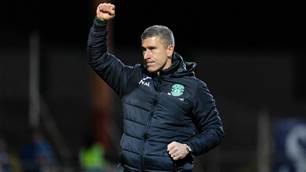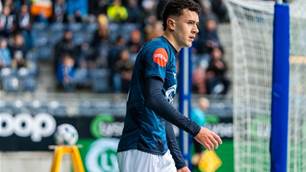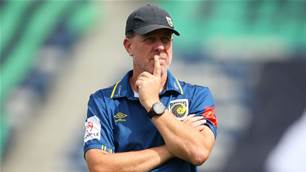We bring together the very best in the game for their expert insight into being a champion
This week I am joined by the very best in the business. You could call them the Alex Ferguson, Jose Mourinho, and Ange Postecolgou of the fantasy football world, but I won’t, because I just can’t imagine any of them having a moody hissy fit - these guys are absolute gentlemen!
Matthew Martyniak and Kelvin Travers finished first and second in the official English Premier League fantasy football competition last season, which is an incredible achievement considering they did battle for that crown with over two and half million people worldwide. Here in Australia, Justin Civitillo won the Fox Sports Fantasy A-League competition in 2011/12, and then astonishingly managed to follow that up with a fourth placed finish last season as well! All three have kindly agreed to let us in on some of the thinking, and give us an insight into some of the secrets of their success.
How long have you been football fans for, and how much time would you each spend watching, playing or reading about the game?
Matt: I have been a football fan just about all my life - I think I was around five years old when I first took an interest in it, which makes it 33 years in total for me being a football fan. Sadly due to work commitments I don't play much football anymore, though I used to play it almost every day when I was a child, and about two to three times a week as a teenager and young adult. I would say I spend a couple of hours a week reading about football and I usually watch one or two games each weekend if I can.
Kelvin: As long as I can remember! I don’t support a Premiership team (I support Leeds) so I don’t need to battle with my heart ruling my head like other players might when selecting players. I read about, or watch football pretty much every day. Whether it be the latest news, internet blogs, watching on TV, or actually going to a few games to support Leeds.
Justin: 14 years now, though I watched football on and off before that - mostly World Cups and the odd game here and there. My PhD thesis topic relates to football, I work on a database for a football video game, and I write for a fantasy football website. Doing all that and watching about 8 games a week, plus reading as many articles as I can get my eyeballs on... that's a lot!
What is it like when you are actually in the running to win a fantasy football comp? Did you guys feel pressure during the final few gameweeks when the end was in sight?
Justin: Yeah, there's a lot of pressure, especially if you get in front. You think you're so close, so don't mess it up now. But I calmed myself by thinking that it was a free game so I had nothing to lose, and that I should keep trusting my knowledge and judgement.
Matt: It was a great feeling to be in with a chance of winning the Fantasy Premier League. Thankfully I didn't feel any pressure at all in the final gameweeks and my mind and thoughts were very clear with each decision I made. Though I have to say that the stress in those final few weeks was unbearable at times as I knew just one mistake would probably cost me the title.
Kelvin: At the time I was just enjoying playing, it wasn’t until we reached the final few weeks of the season when I suddenly realised I realistically stood a chance of winning. Looking back now I can see the magnitude of what I was achieving at the time, which makes the fact I felt under no pressure at all seem all the more surprising. The only time I felt any pressure was during the last 90 minutes of the season and waiting for the final set of bonus points to be added, other than that I was just enjoying the ride! (for those of you who don’t know the incredible story of last season, Matt beat Kelvin after the final whistle of the final game when bonus points were allocated - JZ)

What do you each consider the best sources of information for your decision making?
Justin: For me it's a combination of everything - my own knowledge of the sport, analytical articles I read, checking statistics, gut feeling and of course actually watching as many games as I can - including going to games and taking notes and photos and trying to work out why what happened, happened.
Matt: Mainly watching games, either live or the highlights. I relied on my own judgement from watching these games along with my gut feeling on what the next and best decision should be for my team. Thankfully it worked out most gameweeks than not. Also looking at fantasy football forums, along with Premier League fans forums, gave me useful information about Premier League players, teams and their formations / tactics.
Kelvin: There’s a huge amount of luck involved in fantasy football, anybody who says otherwise is lying. That said, luck can only get you so far, a sound knowledge of football and statistics is what separates the good players from the great players. Analysing not just the players who are in your team (or you’re considering), but also analysing the strengths and weaknesses of the players they’re going to come up against over the coming weeks. A striker who scores a lot of headed goals versus a team that concedes a lot from set pieces or corners is an example of how you can monitor not just statistical strengths, but also weaknesses.
Of all the stats available, are there any that you pay particular attention to?
Kelvin: Heat mapping and player positioning, along with stats such as shots inside and outside the box. For midfielders I’d look at chances created, crossing and passing accuracy, and for defenders a mixture of the above combined with the ability to keep clean sheets and offer a goal threat from set pieces. The main statistic is minutes played – there’s no point in picking players who don’t play!
Justin: I look at detailed team statistics, like passing statistics, area of influence of their players etc as I think that paints a fairly accurate picture of what type of football each team likes to play - and I try to avoid players from teams that are playing a style that won't generate many quality chances, and therefore their players aren't much use in fantasy football.
Matt: I rarely looked at stats. I mainly used my eye from watching games to judge which player was what. If I did look at stats it was for games I did not watch live. I just looked at the obvious stats that were how many assists/goals, how many minutes did a player play, what position they played in, what formation did the team play, who took the set plays, who got subbed off/on and the reasons why, how many cards received, and a close eye on the next three upcoming fixtures.
Are there any not-so-obvious variables that you take into account which other managers might not think of?
Matt: Some variables I looked at are not really stat based but more subjective measures from what I see or hear about a player. I looked closely at a players fitness level - such as are they just 'fit to play' or are they actually 'match fit' and what is their 'sharpness' like on the field. I also looked closely at a players body language, motivation and hunger to do well.
As a physiotherapist myself who specialises in sports injuries, I kept a close eye on player injury reports and used the public information available, along with my own clinical judgement, to determine how the player can perform, or not perform, with these injuries, or after these injuries. I felt this helped me greatly to in my final decision whether to pick or not pick a player, buy or sell a player, and also when to do all of this optimally.
Kelvin: Psychological things like players up against their old clubs, or local derbies can have an impact on a game of football; therefore they can have an impact on a fantasy football team. Another variable which might not be so obvious is the weather! The sun can be shining in London but there could be 2ft of snow in Newcastle and a game could be called off. British weather and how the country reacts (or seemingly can’t react) to it can have an influence on football.
Justin: Not really, though if you aren't following the games closely maybe they don't seem obvious. Things like players changing position seem to often go unnoticed by many fantasy managers.
When picking your team, do you take into account the team a particular player is part of, or is it more about individual performance regardless of their team?
Kelvin: You have to consider the team as well as the player. You can be the best striker in the world, but if you’re playing in a team that doesn’t create chances you won’t score. You can be a great goalkeeper, but if your defence is useless you’ll still concede. One difference with fantasy football is trying to spot players who are playing for ‘lesser’ teams, but still pick up the points. For me, last season I had Michu from Gameweek 1 as I’d researched his goal scoring exploits in Spain. That let me get a headstart on others not just from his points, but also from his price rocketing upwards.
Matt: I look at both - the players individual performance and also the team they play for. The ideal scenario is having an in-form player playing in and in-form team, playing against out of form players from out of form teams.
Justin: I do take account of that, because looking at the scoring of last year's A-League, some teams were very bad points scorers, perhaps with a sole exception on the roster.
How often do you take risks during the course of a season, for example when picking players or when choosing your weekly captain?
Matt: I rarely took risks last season. I think this was one of the main reasons to my success. I just tried to keep it simple each gameweek and go with the obvious form players, tactics, formations, and captains. I rarely deviated from captaining one of the three best players in last seasons game - RvP, Bale and Suarez.
I am trying to apply the same tactics this season - but the obvious players, tactics, formations, and captains, are not producing the points as much so far.
Justin: I like to go with what all of my information is telling me to do. Sometimes my information might conflict - like, for example, a team in form is playing away to a team out of form and missing key players, though the in form team has never won at that ground and their star striker, leading the league in goals, has never scored there in 12 games - so there you have to judge whether to go with history or form.
Kelvin: That depends on the definition of a risk. Something I consider risky might not be what other players consider risky. I remember one week taking a ‘risk’ on Berbatov as captain at home to QPR, he scored a brace and bagged me 26pts that nobody else had. I also took a risk towards the end of the season not having Suarez, the rest of the top 20 had him, captained him and he scored a hat trick. I like to think I took calculated gambles rather than risks, some worked others didn’t.
Which is the more important consideration, upcoming fixtures or player form?
Kelvin: Form over fixtures. The trick is picking players before they hit form, and you can usually do that by looking at upcoming fixtures. So I suppose it’s a mixture of both. Theo Walcott could be a great example of this over the coming weeks. Whilst everybody is looking at Ozil, Giroud and Ramsey (rightly so), they’re forgetting about the player who was Arsenal’s top points scorer last season. Once he’s back from injury he’ll be going straight back into my team this season.
Matt: Player form over the fixtures is the most important consideration I tend go with all the time. You will often find good players with good form usually score points regardless of the opposition, which cannot be said of the other way round. Though the ideal scenario is the player having both the good form and the good fixture.
Justin: Player form should never be ignored but I pay great attention to fixtures. If a player has scored three weeks in a row, but all against the worst defensive teams in the league, I don't then expect them to keep scoring if for the next 5 weeks they play the top 5 defensive teams.
When considering fixtures, how far ahead do you look, and do you take into account other obligations like midweek Champion’s League or upcoming international matches etc.?
Justin: I'll generally look at least 5 or 6 fixtures ahead. Absolutely - I think planning ahead is very important if you want to have a squad full of available players while other managers with less foresight cop 4 key players out in one week because they weren't prepared.
Matt: I tend to only look around three gameweeks in advance as a lot can happen in just a week in real football as well as in fantasy football. I find if I look more than three weeks in advance then it is more guesswork rather than using sound reasoning and judgement.
Yes sure I always have an eye on the upcoming midweek competitions and fixtures. It is important to see how these fixtures can impact positively or negatively on my fantasy football team players and tactics.
Kelvin: I usually look at the next three as a short term goal, beyond that anything can happen with form or injuries. With defenders I’d try and look a little further ahead, 6 fixtures, so I can focus my transfers on my midfield and attackers rather than constantly changing defenders. You absolutely have to consider European games, in particular the Europa Cup as that’s played on a Thursday. The teams who have to travel to Eastern Europe on a Thursday night and then play on a Sunday afternoon always seem to struggle, particularly with clean sheets.
What is your general wildcard strategy going into a season?
Matt: My general wildcard strategy going into a season is just to use it when I feel I need to use it as it is difficult to pre-plan whats what in a football season. However, last season when I won the overall title, I decided pre-season to go with an early wildcard in gameweek two in order to capitalise on the opening double gameweek and the resulting in-form players and price rises. This tactic of playing the early wildcard worked out well for me!
Kelvin: Heading into this season I was going to use my wildcard in the same way as I did last year – save it until later in the season for when we see some “double gameweeks” and maximise points from it. The only reason I would break this plan is if I needed to use it to solve a team crisis, which unfortunately I’ve suffered this year so I’ve had to play my wildcard early.
Justin: I use it late - I like to play it once popular players start losing form and other players, perhaps from teams that have revitalised their season under a new manager, start coming into form. The wildcard allows me to turf out and bring in a lot of new players at once while other managers are stuck to one trade a week, unless they want to cop a points penalty. I find that strategy is a real game breaker if you're near the top. I'd only use my wildcard early if I'd really messed up my team.
How often do you take a point deduction to do more than the allowable transfers in a gameweek?
Matt: I try to keep point deductions to a minimal as it is hard enough getting points each week, never mind giving them away. However, I've always said that a good transfer hit, or points deduction, can pay off very well if you time it right.
I actually only took four -4 point hits last season. While this may sound good, I worked it out that I would have ended up with around 30 to 40 more points overall if I'd have gone with my gut instinct and taken a further three or four hits that I intended to do, which I didn't.
My advice on hits is try to keep them at an absolute minimum, but don't be afraid to take them if it 'feels right', as the rewards can outweigh the risk.
Kelvin: My rule is, as long as I can field a team of 11 players who are guaranteed starters I won’t take a points hit. The only exception would be if there was a double gameweek, but even then I would only do a single extra transfer. Last season I only took two -4pt transfer hits, which was an extremely difficult at times, but over the course of the season it definitely worked out better for me.
Justin: Ideally, never.
Do you look at, and get influenced at all by, your rivals teams (i.e in your mini-leagues) or do you prefer to avoid worrying about them? Do your friends even let you join their leagues anymore?
Justin: Hahaha... I run a league for my friends and family - to start off with I had a few in there, but these days it's just one friend and my dad. I always want to win it, no matter how I'm doing in the overall competition. I have never lost my own league since I started it, so that's 7 seasons in a row.
Kelvin: I never let anybody else influence my team or my decisions. What other people choose to do with their teams, who they transfer in or out, who they’re captaining, whether they’re taking points hits, is all entirely down to them. I don’t worry about what anybody else is doing and focus all my thoughts on researching players and strategies for my own team. That will never change. As for friends’ leagues, I’m now banned from them all for “being too good”… I prefer a challenge anyway!
Matt: Initially I don't get influenced by my rivals teams and I certainly don't worry about them. Though as the season enters the final phase in the last few months it is important that I keep a close eye on all my rivals teams, tactics and potential tactics.
As well as playing my own game, I also play it to how my opponents are playing theirs. I try to outthink and outplay them, and I feel this is a major key to my fantasy football success over the years. I see the leagues I am in as a big game of chess - I analyse every single move by myself and my opponents to its maximum potential.
Haha yes my friends still let me join their leagues thankfully!
Here's one which you might answer differently...what are your thoughts on Emile Heskey as a player and as a fantasy football prospect?!
Matt: Emile Heskey was a superb player and is a legend of football here in England. I have fond memories of watching him as a player at club and international level. Though I have to admit I did not pick him much as a fantasy football prospect as there were always more prolific goal scoring forwards to choose from in the English Premier League back then - such as Robbie Fowler, Michael Owen, Alan Shearer, Thierry Henry, Ruud van Nistelrooy, and Andy Cole, are just to name a few!
Justin: As a player - I think he can do a job. He's very physical which works in our league, he's one of the most experienced forwards so he can outsmart defenders with his positioning and he's good at holding up the ball to bring the Jets other, smaller forward players into the attack. As a fantasy football prospect - he was good at the start of last season. I had him for a little while but he didn't score me many points. I wouldn't consider him at the moment, but I haven't completely ruled him out.
Kelvin: I personally don’t rate him as either, and the fact he was in the England team for so long demonstrates some of the problems with English football. When you read the story about him signing for Aston Villa in 2009, and the fact Martin O'Neill opted for him over Radamel Falcao, it’s astonishing. Since January 2009 Heskey has scored 18 league goals, Falcao has scored 113.
Finally, what one piece of advice would you give people to keep in their minds when making transfer decisions or selecting their teams each week?
Justin: Think ahead - it's a cliché, but the season is a marathon, not a sprint.
Kelvin: Wait until Friday at the earliest! So many people seem to make transfers as soon as the games have finished on a Saturday afternoon, chasing the points from the players who’ve scored that day. Take some time, look at some statistics, wait for injury and team news, and instead of just being a ‘sheep’ and putting in players who’ve scored well in the previous weeks, be on the lookout for players who could be about to score well in the coming weeks.
Matt: Pick the best fantasy football players, formations, and tactics, in relation to how the fantasy football game and the real football game are set up, and do this in blocks of three gameweeks at a time. Thank you to Julian and FourFourTwo for the pleasant interview - all the best to you and all the readers for the fantasy football season.
***
Well there you have it, it seems to me as though there isn’t one recipe for winning, but there certainly are some commonalities – plan ahead, be patient, be obsessed with football for a few decades, and of course a bit of luck on your side goes a long way too. My thanks to Matt, Kelvin and Justin for their time. If you’re not already following them on Twitter, I really recommend it, they are very generous and willing to share their expertise:
Matt - @spiderm4tt
Kelvin - @K3lvin
Justin - @JC_Kazama
Related Articles

Champion A-League coach set to join Premier League giants

Emerging Socceroos star set to sign for MLS club













